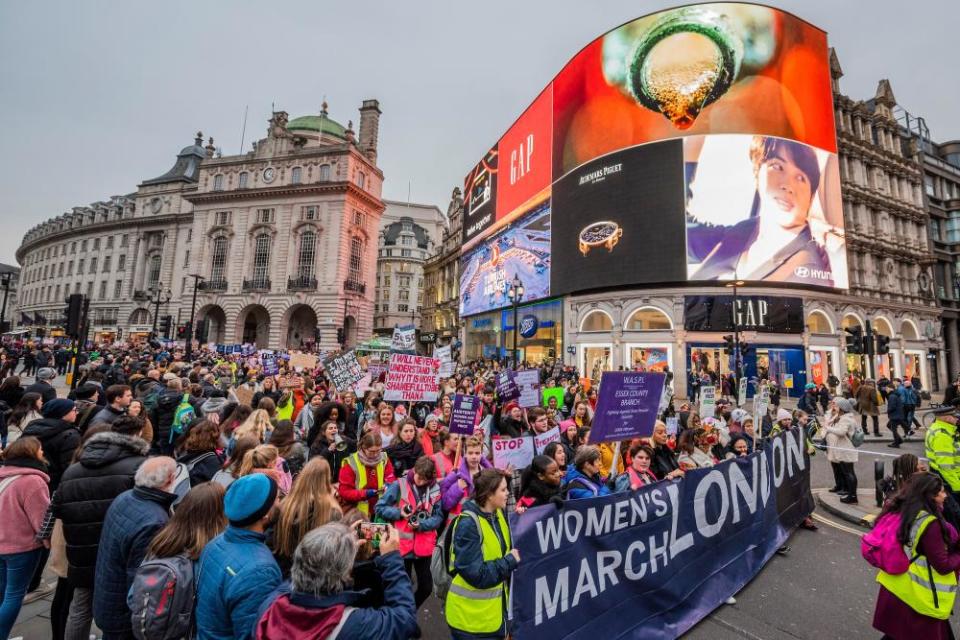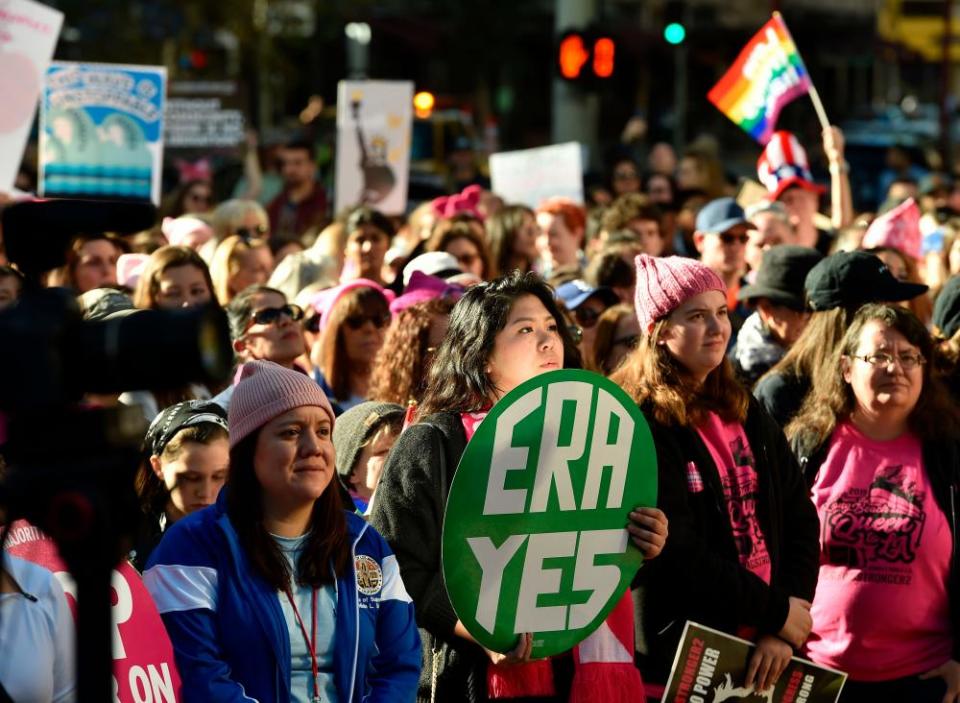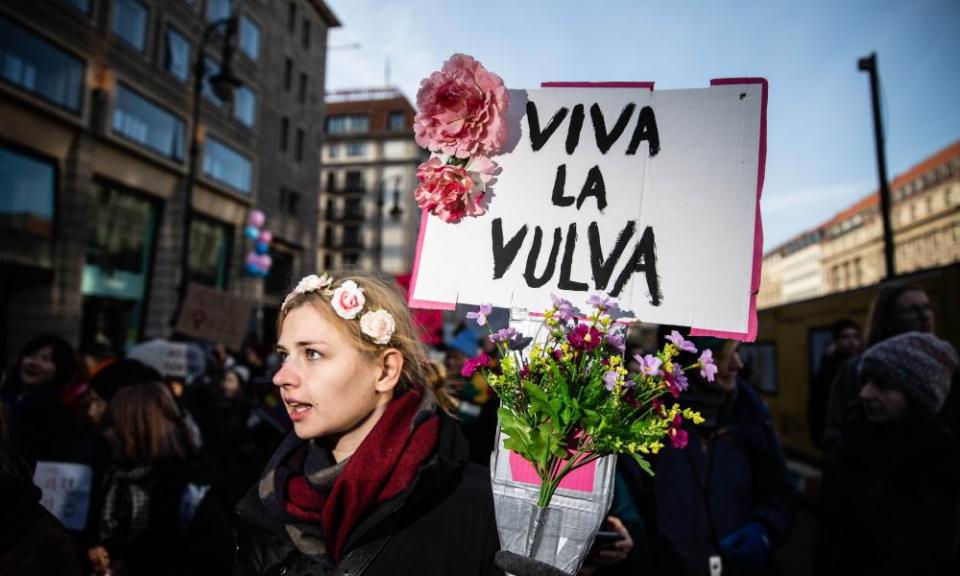Women around the world march against austerity and violence
Propelled by a mass public rendition of Sisters Are Doin’ It for Themselves and accompanied by a thudding police helicopter overhead, hundreds of protesters have rallied in central London in solidarity with an estimated 89 Women’s Marches worldwide.
In Athens, Berlin, Washington DC and Los Angeles, to name just a few, tens of thousands of demonstrators turned out to protest against violence against women and the impact of policies of austerity. They also had some choice words for Donald Trump and Theresa May.
“Today is about improving the living and working conditions of women,” said Dr Shola Mos-Shogbamimu, a lawyer, activist and the organiser of the London protest. “On the ground and in the data, it it is proven that austerity is disproportionately affecting women, especially vulnerable women.”

Themed as the Bread and Roses March, in homage to the 1912 strike that revolutionised working women’s rights in the United States, the London chapter closed down the length of Regent Street, cheered through Piccadilly Circus and marched on to Trafalgar Square to hear a coalition of speakers from the Fawcett Society, Solace Women’s Aid and the Women’s Equality Party.
Students Isobel, 18 and Nicole, 17, had travelled from Kingston for their first protest. Nicole was there “for science and to prove a career in engineering can be for everyone”.
“Nicole’s teacher wouldn’t give her the textbook for her physics class for over a month because he assumed she was going to drop out,” said Isobel. “I complained about him but I’m the one who got in trouble,” said Nicole. “He would separate groups in class into boys against girls.”
The first Women’s March, held the day after Donald Trump’s inauguration in 2017, was the largest single-day protest in US history, drawing millions of people to the streets in the US and around the world to reject Trump in a colourful riot of placards, fury and pink “Pussyhats”.

But the marches held in the US yesterday appeared to struggle to reach the heights of previous iterations, attracting tens of thousands rather than millions of people after controversial statements by organisers were blamed for pushing down numbers.
While rallies took place in cities such as New York, Los Angeles, Atlanta and, chiefly, Washington DC, they appeared diminished after accusations of antisemitism. In 2017 Tamika Mallory, one of the co-chairs of the Women’s March leadership, was criticised after she posted a photo on Instagram of herself and Louis Farrakhan, the Nation of Islam leader who has made anti-semitic statements, calling him “the GOAT” – greatest of all time. Mallory has since said that she does not agree with all of Farrakhan’s statements, but refused to condemn him.
The row, though, continues to cast a shadow. Yesterday rifts within the movement caused rival events to be held in New York and Philadelphia, with organisers deciding not to hold a march at all in Chicago. Plans to march in Eureka, California were cancelled after supporters decided that the protest would be “overwhelmingly white”.
Elsewhere, however, the mood was buoyant, if angry. In Athens women held placards declaring “Silent No More” next to a picture of Athena, the ancient Greek goddess of wisdom. In Berlin about 2,000 people turned out to protest near the Brandenburg Gate, with slogans including “I’m Not Ovary Acting” and “Fight Like a Girl”.

And in London, women waved signs emblazoned with messages including “Girl Power!”, “Put on your war paint” and, out of support for a BBC Radio 2 DJ, “Sara Cox: SMASHING IT!”.
Thirteen year-old Izzy Gage from Fairham in Hampshire had asked her mother, Suzie, if they could come “because we’re feminists and just because I’m a girl, I’m not less”. Alison Traub had also come from Cambridge to support her daughter: “It’s hugely important to have our voice heard … to spur people on and be here and be counted. The upside is that it will inspire people to do something in a practical way.”
The inspiration for this year’s London march was the Polish-born American suffragette and workers’ rights campaigner Rose Schneiderman, who, after the Triangle Shirtwaist factory fire in New York in 1911 where 146 mainly female garment-industry workers died, declared: “The worker must have bread, but she must have roses, too.” One placard held aloft read: “Sugar and spice and reproductive rights.” Another, quite simply, “Theresa May, we won’t pay”.
Not all words for Britain’s second female prime minister were said in anger, however. Promoting the message #WeAreChange, activist Helen Pankhurst and Labour MP Dawn Butler drew huge cheers, and Butler declared: “We march for every single woman. This might not be popular, but Theresa May, we march for you too.”

 Yahoo News
Yahoo News 
